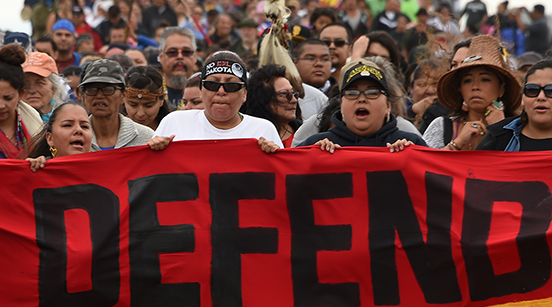Politics & Economy
A federal judge has officially shut down the Dakota Access Pipeline over significant environmental and health risks, granting a major win to the Standing Rock Sioux Tribe following a four-year legal battle to protect their land. (The New York Times)The Atlantic Coast Pipeline, which posed significant risks to the environment and wildlife, has officially been canceled by its developers due to litigation and cost uncertainties. (AP News)The Supreme Court has denied a request by the Trump administration to allow construction of the controversial Keystone XL Pipeline, ruling that it must undergo an environmental review. (CNN)Dominion Energy has secured a nearly $10 billion deal to transfer its natural gas assets to Berkshire Hathaway, reducing its carbon footprint while enabling the continued use of the planet-warming gas. (Los Angeles Times)Action
In a major effort to curb fossil fuel emissions from the transportation sector, California has adopted the nation’s first rule requiring all trucks sold in the state to be zero-emission by 2045. (Los Angeles Times)
Sydney, Australia is now powered entirely by renewable energy following a $41 million solar and wind project, moving the country closer to its carbon neutrality goals. (EuroNews)
A newly announced $2.5 billion philanthropic climate fund will go towards investments in a green recovery from the coronavirus and a transition to clean energy across Southeast Asia. (Reuters)
Health
New research has found that 14 percent of cardiovascular events, including heart attacks and strokes, and 8 percent of cardiovascular deaths globally are attributable to air pollution exposure. (The New York Times)
A new analysis revealed that at least 6 million more property owners across the U.S. face more substantial flood risk than previously known, with rapidly rising sea levels threatening many more. (CNN)
As the western U.S. faces an already active wildfire season, public health officials warn that smoke exposure is likely to worsen the coronavirus pandemic by increasing virus susceptibility. (The New York Times)
Torrential rains intensified by climate change have led to flooding and landslides on Japan’s Kyushu island, causing at least 61 deaths and hundreds of thousands of evacuations. (Phys.org, Japan Times)
Equity
A recent analysis found that the Small Business Administration approves disaster loan applications for white communities at twice the rate of black communities and covers a higher portion of damages reported by whites than by Blacks. (E&E News)
A new report found that women and girls face a disproportionate burden from climate-induced displacement due to the risk of sexual violence in shelters and the need to take on extra labor to support their families. (Reuters)
Kicker
Up for a planet-loving challenge? Join 250 million global participants going plastic-free in July!
“It’s humbling to see how actions we took four years ago to defend our ancestral homeland continue to inspire national conversations about how our choices ultimately affect this planet.”
– Mike Faith, Standing Rock Sioux Tribe chairman
|

